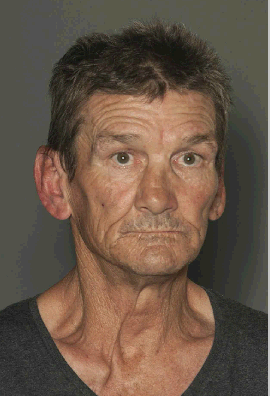Eight years ago, 56-year-old Robbie Jacob disappeared. His children and grandchildren have never seen him since. He was vulnerable, suffered from health problems and addiction, and spent a lot of time around the homeless community; but he was also well-loved, generous, a larrikin, a poet. Where, his family and the police want to know, is he now? What happened to him?
Robbie Jacob is one of 14 long-term missing persons – missing for a period of three months or more – whom ACT Policing hope to find. Missing Persons Week (30 July to 5 August), an annual national campaign, highlights those people, and reminds the community to pass on any information they might have.
Every year, 55,000 Australians go missing; 99 per cent of them are found, almost all alive and well. More than half were teenagers. Last year in the ACT, 353 people went missing, and all were found, most within a week. But over the years, not all have been.
“Some cases are resolved really quickly,” Det Sgt Emma Quade said. “But that’s not always the case. Then we end up with the ones that are years and decades old.”
Some people have been missing since the mid-1970s, but even after nearly half a century, police have not given up hope.
“We’re absolutely hopeful that we’re going to find some information that will help us locate the missing people,” Superintendent Scott Moller said.
“We do that because of our desire to help the community and to help the families that are involved, because they are still looking for the answers. They’ve got a lot of unresolved questions, as we do, so we’ll keep pursuing those investigations until we get an outcome.”
During Missing Persons Week, the GIO Stadium, Transport Canberra, the Westfield and South.Point shopping centres, and ACT Libraries will advertise the campaign. Several buildings will also be lit up in yellow, the colour of Missing Persons Week.
“That will be a reminder to the community and also demonstrate to the families that we haven’t forgotten and we’re still pursuing answers for their families,” Det Sgt Quade said.
Robbie Jacob
Robert Hal (Robbie) Jacob was last seen at the Civic bus interchange on Thursday 12 November 2015. His daughter reported him missing three weeks later. His disappearance was out of character, police say, and they have serious concerns.

Born in 1959, Mr Jacob is described as slim, Caucasian, 5 foot 10 (179cm) tall, with short greying dark brown hair, and brown eyes. His left thumb has limited mobility. He has tattoos on both arms: on his left forearm, a graphic of barbed wire, Ned Kelly, ‘Mum’ and ‘Dad’; on his left arm/shoulder ‘BIANCA,’ and ‘BRIONY’. At the time of his disappearance, he had medical issues with his heart and lungs.
“Robert or Robbie as he is known to family and friends, has four children – a son and three daughters,” his family say. “He is tremendously loved and missed by his children and grandchildren. Robbie enjoyed taking his children to the park to play with a football when they were young, something his children remember fondly.
“Robbie liked to write poems and quotes which he shared with his kids. Robbie could often be found walking around kicking a footy or riding a bike. He was well known and liked in the community and known to be a bit of a larrikin.
“Robbie is a loving and generous person. He often brought presents for his grandchildren on his regular visits. It was rare for him to turn up without a little trinket, or a loaf of bread or something similar.
“For a man that doesn’t have much, Robbie is extremely generous. He would say: ‘If it’s your last $10 and someone really needs it, you give it to them.’
“Robbie is a vulnerable member of our community and has suffered from addiction problems during his life.
“He was reported missing on 3 December 2015. Robbie checked in with his children generally a few times a week and if not with his children, he was always around others in the community. His disappearance is extremely out of character.”
Supt Moller said: “His family still want to know what happened and where he is, as do we police. If anybody has information in regards to his whereabouts, or any sightings of him around that time that we might not be aware of, could they provide that information to police?”
Police also want information about the following long-term missing people:
- Jean Policarpio: disappeared in 2017, would now be 27
- David Abuoi: disappeared in 2012, would now be 46
- Laura Haworth: disappeared in 2008, would now be 39
- Amelia Hausia: disappeared in 1992, would now be 49
- Megan Mulquiney: disappeared in 1984, would now be 56
- Elizabeth Herfort: disappeared in 1980, would now be 62
- Wendy Dalla: disappeared in 1975, would now be 78
- Kate Alexander: disappeared in 1974, would now be 111
For more information, visit the ACT Policing website.
“We never close a case until we know what’s happened,” Det Sgt Quade said. “It doesn’t matter how much time has passed. We’re still seeking answers. So, if you have any information, please contact us.”
“The grief that the [families] experience is as real today as it was 49 years ago,” Leading Senior Constable Colleen McKillop said. “It doesn’t wane at all.”
While the passage of time makes finding these people more difficult, Det Sgt Quade says, sometimes people are more inclined to provide police information.
“Family structures change; people’s allegiances to each other change; people might be more likely to report to police…
“There might be deaths or things that happen in the family where someone might have been concerned about providing information, but no longer are. Maybe people find things when going through someone’s home. You just never know when new information might come to light.”
During unsolved missing persons campaigns, she said, police often receive a lot of information that people might not have considered significant, but which might be “the key factor for us to pursue a new avenue to locate somebody”.
“Our job is to put all the information together,” Supt Moller said. “Someone in the community might have a piece of information that they don’t think is relevant – but with us holding other pieces of information, we’re able to get the whole puzzle.”
Why do people disappear?
Anyone, regardless of gender, age, ethnicity, or educational background, may become a missing person, the AFP states.
“There’s no typical missing persons case or outcome, because they are all individualised,” Supt Moller said.
Vulnerable members of the community are most at risk, he said. The AFP lists children and young people; those with mental illness or depression; the elderly and those with dementia; persons expressing suicidal thoughts; and those with an intellectual or physical disability, or without lifesaving medication.
Reasons for going missing include anxiety and depression, misadventure, homelessness, dementia, domestic violence, becoming a victim of crime, and drug/alcohol abuse.
“People go missing for many reasons, and some people don’t want to be found,” Supt Moller said. “Some people are escaping violent relationships, and they’re trying to stay away from those relationships… In those cases, once we get involved, if we identify the person is safe and well, we’re content with that. If the person doesn’t want to be found, doesn’t want anybody else to know where they are, we don’t tell them.”
Canberra’s cold weather poses a particular problem for vulnerable people, he said.
“In the middle of winter, four hours can be a long time to go missing, and it can be extremely dangerous for them. That’s why we encourage people to report any concerns they have earlier than later.”
Anybody can report a missing person
In fact, anyone can report someone as missing at any time. You do not have to wait 24 hours to report someone as missing, as one myth has it.
“If you have any concerns for the welfare of someone, you can report that to police,” Det Sgt Quade said. “We would really encourage anyone to report as soon as they can, because we have a far greater chance of being able to find someone safe and well.
“Another myth is that only a family member or next of kin can report someone missing. Anybody can report someone missing. That’s particularly important for our more vulnerable members of the community that might not have so many family connections.
“If you have someone that you see every day at a certain location, and that person might not have contacts that you are aware of, and then that person is not there anymore, we’d still like that to be reported to police as a missing person so we can investigate that.”
General duties police officers are initially engaged in missing persons investigations, LSC McKillop said. Depending on the circumstances, the criminal investigations unit might also investigate. A short-term and long-term missing persons team both oversee those investigations to support the general duties and criminal investigations teams. ACT Policing also engage with a national network of missing persons units.
When a person is reported missing, police gather information about their pattern of life to identify avenues of inquiry, LSC McKillop said.
“So, if someone’s making a report, we need to know about employment details, associates, friends, relatives, places they may frequent, phone details and bank details, so that we can try to trace what is a normal pattern for them and identify where those patterns may have changed or altered. We undertake enquiries with external agencies and other police jurisdictions just to try to narrow down perhaps the last place they were seen and the last place that we can put them, and progress from there.”
Hopefully somebody will remember something, and help find these missing people.
Call Crime Stoppers on 1800 333 000, or email [email protected].




